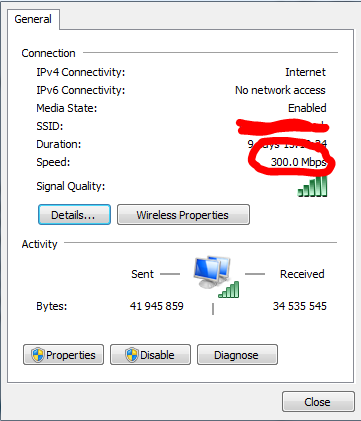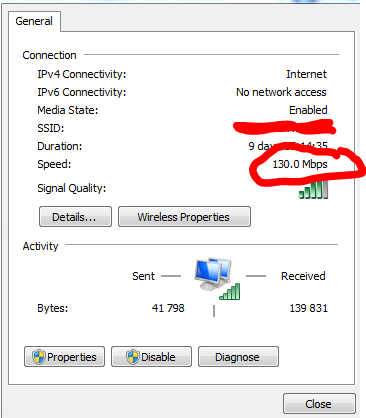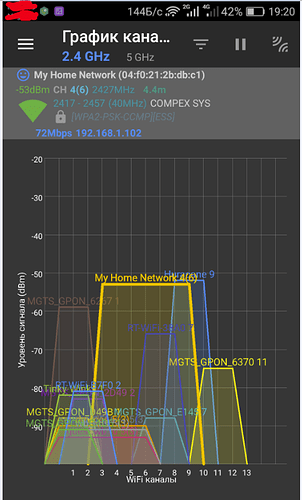On a TL-WDR3600 that was constantly rebooting when watching youtube live video streams, this error appeared using
logread -f
(before it froze and reboot itself)
Sun Nov 8 01:36:08 2020 kern.warn kernel: [92948.701972] ------------[ cut here ]------------
Sun Nov 8 01:36:08 2020 kern.warn kernel: [92948.706692] WARNING: CPU: 0 PID: 0 at backports-4.19.137-1/net/mac80211/rx.c:4551 0x87629da4 [mac80211@87600000+0x6c5c0]
Sun Nov 8 01:36:08 2020 kern.warn kernel: [92948.717760] Rate marked as an HT rate but passed status->rate_idx is not an MCS index [0-76]: 127 (0x7f)
Sun Nov 8 01:36:08 2020 kern.warn kernel: [92948.727385] Modules linked in: ath9k ath9k_common pppoe ppp_async ath9k_hw ath pppox ppp_generic nf_conntrack_ipv6 mac80211 iptable_nat ipt_REJECT ipt_MASQUERADE cfg80211 xt_time xt_tcpudp xt_state xt_nat xt_multiport xt_mark xt_mac xt_limit xt_conntrack xt_comment xt_TCPMSS xt_REDIRECT xt_LOG xt_FLOWOFFLOAD xt_CT slhc nf_reject_ipv4 nf_nat_redirect nf_nat_masquerade_ipv4 nf_conntrack_ipv4 nf_nat_ipv4 nf_nat nf_log_ipv4 nf_flow_table_hw nf_flow_table nf_defrag_ipv6 nf_defrag_ipv4 nf_conntrack_rtcache nf_conntrack iptable_mangle iptable_filter ip_tables crc_ccitt compat ledtrig_usbport nf_log_ipv6 nf_log_common ip6table_mangle ip6table_filter ip6_tables ip6t_REJECT x_tables nf_reject_ipv6 ehci_platform ehci_hcd gpio_button_hotplug usbcore nls_base usb_common
Sun Nov 8 01:36:08 2020 kern.warn kernel: [92948.795620] CPU: 0 PID: 0 Comm: swapper Not tainted 4.14.195 #0
Sun Nov 8 01:36:08 2020 kern.warn kernel: [92948.801632] Stack : 00000000 800b2c34 80500000 804b066c 00000000 00000000 00000000 00000000
Sun Nov 8 01:36:08 2020 kern.warn kernel: [92948.810146] 00000000 00000000 00000000 00000000 00000000 00000001 87c07cd0 19976158
Sun Nov 8 01:36:08 2020 kern.warn kernel: [92948.818655] 87c07d68 00000000 00000000 00003f18 00000038 804491d8 00000008 00000000
Sun Nov 8 01:36:08 2020 kern.warn kernel: [92948.827147] 000000d5 12e9009a 000000d4 00000000 87c07cb0 00000000 00000000 876675f0
Sun Nov 8 01:36:08 2020 kern.warn kernel: [92948.835657] 87629da4 000011c7 00000000 87412080 00000002 80280814 00000000 80630000
Sun Nov 8 01:36:08 2020 kern.warn kernel: [92948.844166] ...
Sun Nov 8 01:36:08 2020 kern.warn kernel: [92948.846648] Call Trace:
Sun Nov 8 01:36:08 2020 kern.warn kernel: [92948.846659] [<800b2c34>] 0x800b2c34
Sun Nov 8 01:36:08 2020 kern.warn kernel: [92948.852690] [<80500000>] 0x80500000
Sun Nov 8 01:36:08 2020 kern.warn kernel: [92948.856258] [<804491d8>] 0x804491d8
Sun Nov 8 01:36:08 2020 kern.warn kernel: [92948.859835] [<87629da4>] 0x87629da4 [mac80211@87600000+0x6c5c0]
Sun Nov 8 01:36:08 2020 kern.warn kernel: [92948.865840] [<80280814>] 0x80280814
Sun Nov 8 01:36:08 2020 kern.warn kernel: [92948.869401] [<8006a56c>] 0x8006a56c
Sun Nov 8 01:36:08 2020 kern.warn kernel: [92948.872939] [<8006a574>] 0x8006a574
Sun Nov 8 01:36:08 2020 kern.warn kernel: [92948.876479] [<80084d30>] 0x80084d30
Sun Nov 8 01:36:08 2020 kern.warn kernel: [92948.880039] [<87629da4>] 0x87629da4 [mac80211@87600000+0x6c5c0]
Sun Nov 8 01:36:08 2020 kern.warn kernel: [92948.886060] [<80084db8>] 0x80084db8
Sun Nov 8 01:36:08 2020 kern.warn kernel: [92948.889634] [<87629da4>] 0x87629da4 [mac80211@87600000+0x6c5c0]
Sun Nov 8 01:36:08 2020 kern.warn kernel: [92948.895646] [<803034ac>] 0x803034ac
Sun Nov 8 01:36:08 2020 kern.warn kernel: [92948.899212] [<80303694>] 0x80303694
Sun Nov 8 01:36:08 2020 kern.warn kernel: [92948.902762] [<876d43f4>] 0x876d43f4 [ath9k_common@876d4000+0x2be0]
Sun Nov 8 01:36:08 2020 kern.warn kernel: [92948.909080] [<876e77c0>] 0x876e77c0 [ath9k@876e0000+0x18290]
Sun Nov 8 01:36:08 2020 kern.warn kernel: [92948.914844] [<876e77a0>] 0x876e77a0 [ath9k@876e0000+0x18290]
Sun Nov 8 01:36:08 2020 kern.warn kernel: [92948.920622] [<876e4a24>] 0x876e4a24 [ath9k@876e0000+0x18290]
Sun Nov 8 01:36:08 2020 kern.warn kernel: [92948.926363] [<800b8454>] 0x800b8454
Sun Nov 8 01:36:08 2020 kern.warn kernel: [92948.929919] [<80087e1c>] 0x80087e1c
Sun Nov 8 01:36:08 2020 kern.warn kernel: [92948.933455] [<800b4380>] 0x800b4380
Sun Nov 8 01:36:08 2020 kern.warn kernel: [92948.936994] [<8044ed28>] 0x8044ed28
Sun Nov 8 01:36:08 2020 kern.warn kernel: [92948.940548] [<800b8e24>] 0x800b8e24
Sun Nov 8 01:36:08 2020 kern.warn kernel: [92948.944090] [<8022f740>] 0x8022f740
Sun Nov 8 01:36:08 2020 kern.warn kernel: [92948.947625] [<800657d8>] 0x800657d8
Sun Nov 8 01:36:08 2020 kern.warn kernel: [92948.951175]
Sun Nov 8 01:36:08 2020 kern.warn kernel: [92948.952691] ---[ end trace c85213225f7d126a ]---
Sun Nov 8 01:38:22 2020 kern.warn kernel: [93082.225797] ------------[ cut here ]------------
Sun Nov 8 01:38:22 2020 kern.warn kernel: [93082.230557] WARNING: CPU: 0 PID: 0 at backports-4.19.137-1/net/mac80211/rx.c:4551 0x87629da4 [mac80211@87600000+0x6c5c0]
Sun Nov 8 01:38:22 2020 kern.warn kernel: [93082.241603] Rate marked as an HT rate but passed status->rate_idx is not an MCS index [0-76]: 126 (0x7e)
Sun Nov 8 01:38:22 2020 kern.warn kernel: [93082.251234] Modules linked in: ath9k ath9k_common pppoe ppp_async ath9k_hw ath pppox ppp_generic nf_conntrack_ipv6 mac80211 iptable_nat ipt_REJECT ipt_MASQUERADE cfg80211 xt_time xt_tcpudp xt_state xt_nat xt_multiport xt_mark xt_mac xt_limit xt_conntrack xt_comment xt_TCPMSS xt_REDIRECT xt_LOG xt_FLOWOFFLOAD xt_CT slhc nf_reject_ipv4 nf_nat_redirect nf_nat_masquerade_ipv4 nf_conntrack_ipv4 nf_nat_ipv4 nf_nat nf_log_ipv4 nf_flow_table_hw nf_flow_table nf_defrag_ipv6 nf_defrag_ipv4 nf_conntrack_rtcache nf_conntrack iptable_mangle iptable_filter ip_tables crc_ccitt compat ledtrig_usbport nf_log_ipv6 nf_log_common ip6table_mangle ip6table_filter ip6_tables ip6t_REJECT x_tables nf_reject_ipv6 ehci_platform ehci_hcd gpio_button_hotplug usbcore nls_base usb_common
Sun Nov 8 01:38:22 2020 kern.warn kernel: [93082.319477] CPU: 0 PID: 0 Comm: swapper Tainted: G W 4.14.195 #0
Sun Nov 8 01:38:22 2020 kern.warn kernel: [93082.326731] Stack : 00000000 800b2c34 80500000 804b066c 00000000 00000000 00000000 00000000
Sun Nov 8 01:38:22 2020 kern.warn kernel: [93082.335228] 00000000 00000000 00000000 00000000 00000000 00000001 87c07cd0 19976158
Sun Nov 8 01:38:22 2020 kern.warn kernel: [93082.343739] 87c07d68 00000000 00000000 00004a90 00000038 804491d8 00000008 00000000
Sun Nov 8 01:38:22 2020 kern.warn kernel: [93082.352245] 000000fb af6189d9 000000fa 00000000 87c07cb0 00000000 00000000 876675f0
Sun Nov 8 01:38:22 2020 kern.warn kernel: [93082.360751] 87629da4 000011c7 00000000 87412080 00000000 80280814 00000000 80630000
Sun Nov 8 01:38:22 2020 kern.warn kernel: [93082.369256] ...
Sun Nov 8 01:38:22 2020 kern.warn kernel: [93082.371740] Call Trace:
Sun Nov 8 01:38:22 2020 kern.warn kernel: [93082.371751] [<800b2c34>] 0x800b2c34
Sun Nov 8 01:38:22 2020 kern.warn kernel: [93082.377782] [<80500000>] 0x80500000
Sun Nov 8 01:38:22 2020 kern.warn kernel: [93082.381349] [<804491d8>] 0x804491d8
Sun Nov 8 01:38:22 2020 kern.warn kernel: [93082.384904] [<87629da4>] 0x87629da4 [mac80211@87600000+0x6c5c0]
Sun Nov 8 01:38:22 2020 kern.warn kernel: [93082.390936] [<80280814>] 0x80280814
Sun Nov 8 01:38:22 2020 kern.warn kernel: [93082.394479] [<8006a56c>] 0x8006a56c
Sun Nov 8 01:38:22 2020 kern.warn kernel: [93082.398040] [<8006a574>] 0x8006a574
Sun Nov 8 01:38:22 2020 kern.warn kernel: [93082.401583] [<80084d30>] 0x80084d30
Sun Nov 8 01:38:22 2020 kern.warn kernel: [93082.405130] [<87629da4>] 0x87629da4 [mac80211@87600000+0x6c5c0]
Sun Nov 8 01:38:22 2020 kern.warn kernel: [93082.411172] [<80084db8>] 0x80084db8
Sun Nov 8 01:38:22 2020 kern.warn kernel: [93082.414744] [<87629da4>] 0x87629da4 [mac80211@87600000+0x6c5c0]
Sun Nov 8 01:38:22 2020 kern.warn kernel: [93082.420772] [<803034ac>] 0x803034ac
Sun Nov 8 01:38:22 2020 kern.warn kernel: [93082.424330] [<80303694>] 0x80303694
Sun Nov 8 01:38:22 2020 kern.warn kernel: [93082.427903] [<876d43f4>] 0x876d43f4 [ath9k_common@876d4000+0x2be0]
Sun Nov 8 01:38:22 2020 kern.warn kernel: [93082.434201] [<876e77c0>] 0x876e77c0 [ath9k@876e0000+0x18290]
Sun Nov 8 01:38:22 2020 kern.warn kernel: [93082.439994] [<876e77a0>] 0x876e77a0 [ath9k@876e0000+0x18290]
Sun Nov 8 01:38:22 2020 kern.warn kernel: [93082.445761] [<876e4a24>] 0x876e4a24 [ath9k@876e0000+0x18290]
Sun Nov 8 01:38:22 2020 kern.warn kernel: [93082.451518] [<800b8454>] 0x800b8454
Sun Nov 8 01:38:22 2020 kern.warn kernel: [93082.455062] [<80087e1c>] 0x80087e1c
Sun Nov 8 01:38:22 2020 kern.warn kernel: [93082.458619] [<800b4380>] 0x800b4380
Sun Nov 8 01:38:22 2020 kern.warn kernel: [93082.462155] [<8044ed28>] 0x8044ed28
Sun Nov 8 01:38:22 2020 kern.warn kernel: [93082.465692] [<800b8e24>] 0x800b8e24
Sun Nov 8 01:38:22 2020 kern.warn kernel: [93082.469253] [<8022f740>] 0x8022f740
Sun Nov 8 01:38:22 2020 kern.warn kernel: [93082.472797] [<800657d8>] 0x800657d8
Sun Nov 8 01:38:22 2020 kern.warn kernel: [93082.476346]
Sun Nov 8 01:38:22 2020 kern.warn kernel: [93082.477863] ---[ end trace c85213225f7d126b ]---
It is the first time that I get to see an error before the reboot.
I had Force 40mhz mode enabled on 2.412 GHz, which is the only radio enabled on this device, so I've unchecked Force 40mhz mode, since it may be the problem. it hasn't crashed again yet.








